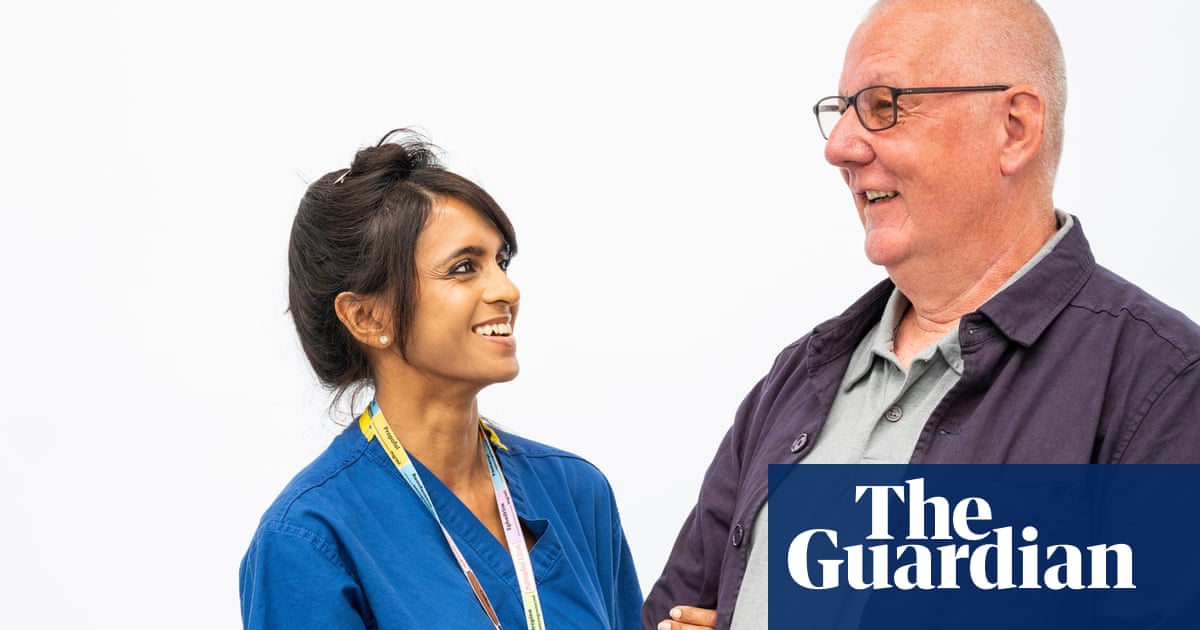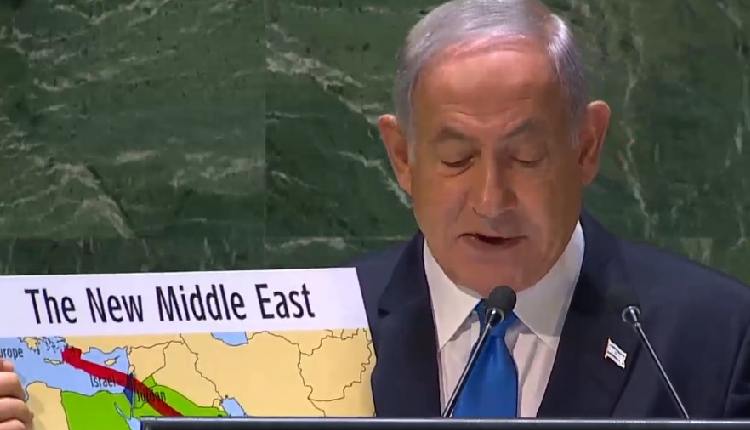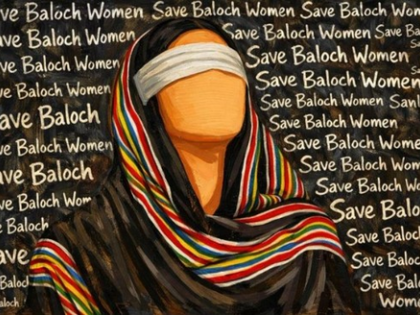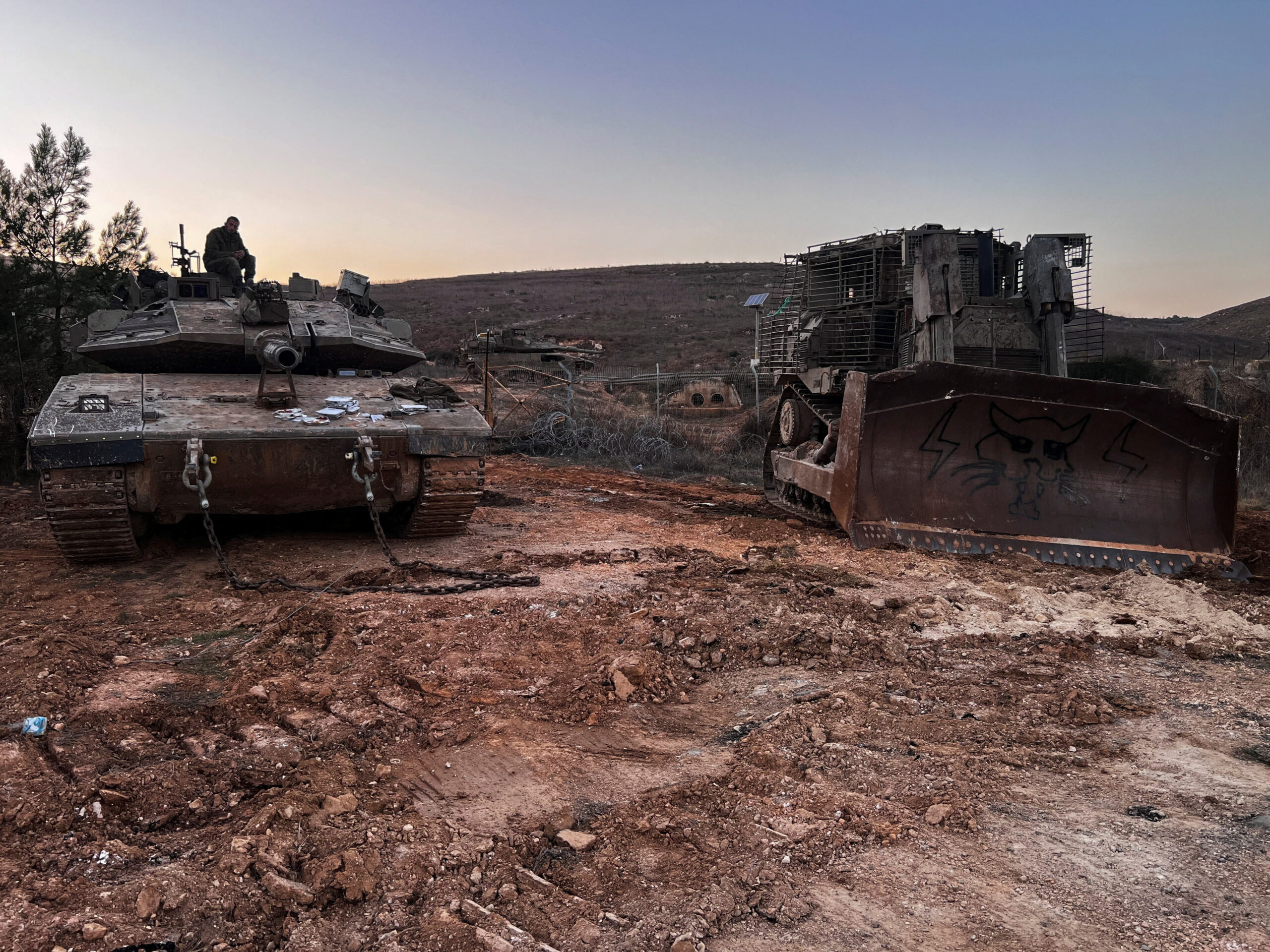
Show caption Dr Susan Jain helped save the life of Salvation Army minister Karl Gray. Photograph: Harry Borden/The Guardian Coronavirus ‘Without her, I wouldn’t be here’: Covid patients reunited with the medics who saved them Four people who were so ill that they barely remember their time in the ICU meet the doctors and nurses who held their hands Sirin Kale Sat 7 Aug 2021 08.00 BST Share on Facebook
Share on Twitter
Share via Email
In a light-filled studio in east London, a petite woman in scrubs receives a bouquet of flowers from a tall man, dressed smartly, only faintly out of breath.
The room is thick with emotion. They are strangers, but stare at each other with wonder in their eyes. And then Dr Susan Jain, an intensive care consultant at Homerton university hospital, breaks the silence with a laugh.
“Hello,” she says. “Wow. It’s amazing to see you up and about.”
Karl Gray, a 60-year-old Salvation Army minister from north London, flashes an embarrassed smile. “I’m sorry,” he says. “I don’t remember you.”
These are not long-lost relatives meeting for the first time. Gray is coming face to face with the woman who saved his life, just over a year after he was admitted to her ICU unit, gasping for breath.
“I don’t remember an awful lot about ICU,” Gray tells Jain. “But I am so grateful for what you did for me in those first few days, and I can never thank you enough. You saved my life. And I’m here today to be able to say that to you, which is amazing.”
“Just seeing you looking great is enough,” she replies, her eyes brimming with tears. “It goes beyond anything. Because it’s no secret that many people admitted to ICU did not survive.”
You became very sick very quickly. You were at death’s door. We thought you were very close to not surviving
Jain is not exaggerating. In England, almost a third of Covid patients admitted to hospital during the early months of the pandemic died of the disease. So conscious were ICU staff of the taint of death that lingered around their units that, during the second wave of the pandemic, some put up posters, reading: “Most people leave here alive.”
Instead of seeing ICUs as places of horror and sorrow, the public should see them as places of great tenderness and love. They are intensive care units, after all. A place where people with fine minds and empathic hearts use all of the powers at their disposal to keep perfect strangers alive.
Yet the relationship between ICU staff and the patients they treat is often curiously one-sided. Many patients hospitalised with Covid-19 were sedated and put on ventilators, to give their organs time to respond to experimental drugs and, hopefully, to heal. Machines flushed out their kidneys, oxygenated their blood, and manually pumped their lungs. Snaking tubes fed them and took away their waste. The patients hovered in a liminal state between life and death.
The lucky ones woke up from the sedation, recovered, and went home. Many of them never knew the names or faces of the people who looked after them so carefully for weeks, or got the chance to thank them for saving their lives. Until now, that is. Over the past few weeks, I have travelled the UK, reuniting for the first time four former ICU patients with the staff who saved them.
***
Karl Gray fell ill around 15 March 2020. By 4 April, he couldn’t breathe. He remembers the ambulance driving towards the hospital. It was early morning. The streets were empty. The last thing he remembers is the ambulance reversing into the bay. The rest is blank.
Jain also remembers the Covid-deserted streets of March and April. “It was eerie,” she recalls. “Like the apocalypse had hit.” Her commute to work took 15 minutes, instead of the normal 40. Once there, Jain would be responsible for an ICU full of sick and dying people. “One of my trainees described our ward round as putting out little fires everywhere,” she remembers. “Our unit usually ran on 12 beds… suddenly we had 30 patients, all ventilated, and all super sick.”
The hardest thing for Jain was having to sedate patients before putting them on a ventilator. The fear in their eyes, as they held her gaze. The knowledge that she may be the last person they would ever see. “Often you would put people to sleep and you knew that was it. It was highly emotional.”
Gray’s work as a Salvation Army minister also brought him into contact with the extremes of the human experience. He was at Grenfell as the tower burned. He has spent decades comforting the sick and the dying. And then, it was his turn.
Dr Susan Jain was one of those who cared for Karl Gray, 60, during the eight weeks he spent in hospital. Photograph: Harry Borden/The Guardian
He arrives at the photographic studio stiffly clutching the bouquet. His wife, Ruth, is by his side. Gray is a stoic, taciturn presence – Ruth does much of the talking – but when Jain arrives, he appears overwhelmed. Ever the doctor, Jain’s eyes immediately flick to Gray’s neck, to see how the scar from his tracheotomy vent has healed. “It’s looking good,” she smiles warmly.
Jain describes the moment they first met. “I can remember you on your bed in the corner,” she says. “You got super sick on the first day. You fell into a heap.” Gray may be abashed that he doesn’t remember Jain, but this is not unusual: he was very sick, and on a cocktail of drugs, and she was wearing PPE that obscured her face.
“You became very sick very quickly,” she goes on, softly. “You slipped into multiple organ failure within 24 hours. You were on a ventilator, you had medicines to help your blood pressure stay up, and a dialysis machine to help your kidneys function. And we were turning you as well.” Proning patients, by rolling them on their front, helps them breathe. “You were at death’s door.” She pauses. “I have to say that, among the consultants, we thought you were very close to not surviving.”
While Jain’s team was working desperately to keep Gray alive, he had surreal, narcotic-influenced dreams. “I was on a hospital ward,” he says, “but the ward was on a submarine somewhere in eastern Europe, in the winter. I could see the faces of all the people, but they had masks on.” Jain nods. “That was you emerging from the sedation,” she says. “Water and boat themes are very common. Because you’re on a mattress that blows up and down to relieve different pressure areas, so people often think they’ve been on a boat.”
Gray remembers brief, discomfiting snippets of his ICU stay: seeing curtains go up, and staff quickly remove patients who had died. “That must have happened four or five times,” he says. “It was emotional, because I knew that could be me who was taken out.”
Jain, too, was not without fear. In the first wave of the pandemic, when vaccines were a faraway hope, and doctors did not yet really know how the virus spread, she would have nightmares that she’d contracted Covid-19 and passed it on to her family. “I’d jump out of bed and check my oxygen saturations, thinking: of course I’m going to get it. Why wouldn’t I?”
It’s emotional to meet her. Without her knowledge and expertise, I wouldn’t be here today. I’m indebted to her for ever
Their conversation turns to survival and faith. There’s a misconception about medical science, says Jain. Doctors don’t have all the answers; they don’t know why some people survive and others die. “I can only remember a couple of other people who were sailing very close to the wind who also survived,” she says. “And we don’t know why. Nobody knows why.”
Gray is a man of faith. “From day one,” he says, “there were hundreds, if not thousands, of people praying for me. And I believe to this day that those prayers were answered. I am totally adamant that is the reason why.”
His road to recovery has been a long one. He spent five and a half weeks in ICU, and a further two and a half in hospital. “I lost the use of the muscles in the lower part of my legs and ankles,” he says. “I had to relearn how to walk.” At home, Gray had to use a walking stick. Going to the bathroom was an effort. “I’m still behind where I’d like to be, physically,” he tells me.
More discomfiting was the mental disorientation. Gray has been shown photographs of his ICU stay, and struggles to square the images he sees with the knowledge that it is him in the photos. “I recognise myself,” he says, “but I don’t remember any of it.” When the medicine started to wear off, Gray mistakenly thought he’d been in a car accident.
Both doctor and patient are different people, post-Covid. “I’m calmer now,” Gray says. “I think I’m more tolerant than I was. I’m more emotional. Things that felt important before don’t feel as important now.” If a car cuts in front of him in the street, or someone pushes into a queue, he doesn’t care. “I’ve realised there’s lots in the world to be grateful for,” he says. “You are just thankful for the ability to be alive, and back with friends and family.”
Jain is considering working less, to spend more time with her children, who are 10 and 12. “In the old, corny way, life is too short,” she says. “It takes a global pandemic to make you realise what’s important to you. I haven’t been able to see my family as much as I’ve wanted to, but now I want to make up that time with them. My parents won’t be here for ever. And I do want to look after my own mental health.”
How is your mental health, I ask. “Fragile,” Jain responds. “Delicate. Yeah.” She feels as though she has been to war.
Jain was raised to be resilient; a grafter. “In truth,” she says, “there was always an expectation that I would be a doctor. My dad was a GP, and there’s an expectation in many Asian families that you will do something professional.” After school, she would often spend afternoons at the surgery, watching him work.
At medical school, Jain was drawn to intensive care because of the intellectual challenge the specialism posed. “My fascination became the ultra-sick patients. I like a conundrum. A diagnostic puzzle. And of course, I love helping people.”
After a life of hard work and compulsive overachievement, the pandemic finally knocked the wind out of her sails. “My whole life, my dad brought me up to be like, ‘Pull the curtains and get over it.’ But this, I don’t mind saying, has knocked me a little bit. It’s vast, in how it feels.”
But today has been a good day, for both Gray and Jain. “It’s emotional to meet her,” says Gray. “Without her knowledge and expertise, I wouldn’t be here today. I’m indebted to her for ever.”
***
On the back of the ICU staffroom door in the Royal Liverpool university hospital is a photograph of Dave Collins, a 66-year-old retired lab technician. He is there to remind staff of one of their great success stories: a man who, against all the odds and the expectations of the doctors treating him, survived.
Collins arrives for our meeting walking slowly, heavily, visibly out of breath. He is waiting to be assessed for supplemental oxygen. The stairs are an effort. “He hides it, but he’s not well,” murmurs his daughter Christine.
He is here to meet Andrew Smith, a 34-year-old ICU nurse. Collins presents Smith with a Liverpool FC face mask. “You’re looking really good,” Smith says. “A lot better than the last time I saw you.” Collins was worried he wouldn’t recognise Smith. “I had a lot of nurses,” he explains, apologetically. But he does remember him. “You tried to get the football commentary on for me,” he says, with recognition. Smith nods. “We won 2-1,” he says.
Andrew Smith nursed 66-year-old retired lab technician Dave Collins in January 2021. Photograph: Craig Easton/The Guardian
Collins was admitted on 29 January 2021, during the second wave. At the time, the hospital was overflowing with Covid-19 patients. For the first few weeks, Smith was on a continuous positive airway pressure, or Cpap, therapy machine to help him breathe, but he continued to deteriorate. The experience of being in ICU was terrifying. “It was like something out of a science fiction film,” he says. “Lines and lines of beds of people in comas and intubated.”
The people around him were dying. “Everyone in his room was doing very badly,” Smith says. “Dave was seeing all of that… he watched the guy opposite him die.” Smith would stop and speak with patients when they were visibly frightened. “They didn’t need to see you running around in that moment,” he tells me. “You had to go and sit with them, because they were obviously petrified.”
He remembers one patient who, certain he would die, transferred all his money to his daughters. “I think about that a lot,” Smith says. “He must have known what was going on.” Collins describes those early weeks in ICU as full of fear. Even in sleep, there was no respite. “I had really vivid dreams,” he says, “and in almost every one of them, I died.”
The staff kept diaries for all the ICU patients, and Andrew Smith wrote entries for Dave Collins. Photograph: Craig Easton/The Guardian
While in the ICU, Collins had time to reflect on his life. “I remember him telling me about his grandkids,” says Smith, “and how the best thing he ever did was retire early and spend time with them, on holiday.” Collins’ words struck a chord with Smith. “There’s a time limit on being a nurse,” he says. “I see people who are still working who, in my opinion, should be enjoying what they’ve got.”
Smith became a nurse, he jokes, “because they didn’t let me be a paramedic. I didn’t get through the interview.” It was a fortuitous rejection: Smith loves nursing, and intensive care in particular. “You get to do absolutely everything for your patients,” he tells me. “You are there to speak up for them when they can’t. You are there to care for them when they are at their sickest.” The worst thing, of course, was when patients died. “No one likes losing a patient,” says Smith. “I hate it.”
Doctors told Collins he needed to be ventilated on 19 February. “At the time they put me under, they said I was the sickest person in the hospital,” he says. Staff set up a Zoom call for him to say goodbye to his family. “That was the hardest thing of all,” he says, in a strangled voice. “Saying goodbye to everyone.” A nurse holding up the iPad had to excuse herself after the call, to sob. His next memory is of seeing a chink of light, as if glimpsed through a letterbox. “I remember the nurse saying, ‘David, you’re doing well, but we have to put you back under. Your body needs to rest.’ And the next thing I remember is like someone flicked a light switch on.”
While Collins was sedated, Smith kept a diary for him, to help him fill in the blanks, as the staff did for all the sedated patients in the unit. “I’m so grateful for the diary,” says Collins, who has brought it with him. The men pore over it together. “Hi Dave,” reads an entry on 1 March, as Collins was beginning to recover. “It’s Andrew again. You keep making really good progress… keep up the good work, mate.”
‘Need to stay alive,’ reads one of the entries Dave Collins eventually managed to scrawl in his diary. Photograph: Craig Easton/The Guardian
Later, the notebook bears Collins’ attempts at communication; the tube in his throat made it impossible to speak. “My name is Dave Collins,” reads one barely legible scrawl. “Need to stay alive,” reads another.
Smith is a stoic, matter-of-fact person, but the past year has changed him. “I’m far more emotional than I have ever been in my life,” he says. “Ask my fiancee. She can vouch for that. I’ve cried at home.” He tried not to think about all the people he lost. “After the first wave,” he says, “you could beat yourself up, thinking about everyone you lost… it’s not healthy.”
Collins, too, is a changed man. “I can only walk very small distances,” he says. Showering is an effort. Doctors say it might be two years before his lungs fully recover. But he is thankful simply to be alive. “You have to appreciate every day,” he says. “Believe me, when you’ve been staring at no more days, you realise that every day is a good day.”
Collins shows Smith the book again. “Need to stay alive,” he reads. “You did the job.” Collins nods. “Thank you.”
***
For years, Santo Hill has volunteered in the charity shop at Blackpool Victoria hospital. As the first wave of the Covid-19 pandemic swept the UK in February 2020, the retired midwife turned B&B owner had no idea that, within weeks, she would be whisked to this same hospital to be treated by her colleagues.
Meeting Hill, 70, I initially think there’s been some kind of mistake. She radiates youthful vigour. She tells me she worked for a decade after her retirement, then bought herself the B&B to run as a hobby. “I’ve only got nine bedrooms,” Hill says. “It’s manageable.”
Hill was admitted on 9 April 2020. “I could hardly breathe,” she says. “I was really struggling.” On 12 April, staff sedated her and placed her on a ventilator. When she came around, on about 25 April – she is not sure of the exact date – Santo was desperate to get out of the ICU. “In my head, I was screaming for my family to come and get me,” she says.
Santo Hill, 70, is a retired midwife who volunteers at the hospital where she was nursed by Naomi Threlfall in April 2020. Photograph: Craig Easton/The Guardian
Born in Malaysia, Hill was the third of 14 children. “From the age of 11, I was cooking for my family, because my mother was having babies,” she says. For her entire life, Hill has been fiercely self-reliant and determined – which made her a horrible patient. “I am a control freak,” she says. “I need to be in charge of my own life. I don’t want anyone else looking after me.”
Hill hated being sick. “It was noisy,” she says. “There was too much light. I couldn’t use my legs.” She was fitted with a tracheotomy tube, so “I couldn’t communicate with anybody. I had had enough.” At one point, she even texted her brother in Germany. “I said: ‘Come and get me. Get me out of here.’”
ICU nurse Naomi Threlfall is not one to hold a grudge against a tricky patient; she visibly radiates compassion and kindness. She says more than once of nursing, “It’s not a profession, it’s a vocation. You have to be a certain kind of person. I love my job.” Threlfall doesn’t see Hill as a demanding patient. “She was no more difficult than anyone else,” Threlfall says. “In all honesty, she had every right to be. She was gasping for breath and really sick. We thought we had lost her numerous times.”
There’s been so much sadness over the last 18 months that to see you today is just beautiful
Hill is not the sort of person to give herself over to public displays of emotion. As a former medical professional, she had excellent insight into her condition, and meeting Threlfall is, for her, mostly about getting answers. “What I want to ask you,” she says at one point, “is why I was on renal dialysis?” Threlfall explains how sick she was. She tells Hill that she didn’t think she was going to make it. The team would prone her, rolling her on her stomach to increase her oxygen flow, but it didn’t help. “My brothers and sisters were told I had a 20% chance of survival,” Hill says.
Threlfall, by contrast, is emotional: “There’s been so much sadness over the last 18 months that to see you today is just beautiful.” It makes Threlfall remember all the people who didn’t make it. “It’s just really sad. And you don’t have time to think about what’s happened. You’ve got to carry on.”
The past year, Threlfall tells me, has taken a toll. She has been a critical care nurse for six years, and the pandemic feels like all of the previous years rolled into one. “I don’t think I could do another end-of-life call with a relative via FaceTime,” says Threlfall. “It shouldn’t have been us sitting with their loved ones as they were taking their last breaths.” It was hardest when the dying patient was awake. “You just sit with them,” says Threlfall. “Hold their hands. Reassure them and try to meet their needs.” Burnout is common. “I think we all have PTSD,” Threlfall says. “We’ve all felt like we were on a treadmill and it’s difficult to keep going, at times.”
Although Hill has made a full physical recovery, she has been more affected by her brush with death than she lets on. “After the second lockdown, when the B&B was closed, that’s when it suddenly hit me,” she says. At a follow-up meeting with the doctor, Hill had a panic attack. The doctor told her to take it easy. She won’t, of course.
As we leave, Hill invites Threlfall to come and visit her at the hospital charity shop, where she has resumed her volunteer duties. They swap numbers. An unlikely friendship may have just started.
***
When consultant anaesthetist Dr Niki Snook walks around the ICU unit at St James’s University hospital in Leeds, she sees the faces of the people who didn’t make it, despite her team’s best efforts. “Every time I look at certain beds, I remember the people in those spaces and the family conversations we had, and it’s heartbreaking,” she says. “We’re not machines. There was many a time when quite a lot of tears were shed.”
But 43-year-old businessman Tariq Butt is one of her success stories. Snook didn’t expect him to survive. “He got so sick so fast,” she explains. Her team transferred him to Wythenshawe hospital, where he was put on an Ecmo machine, a hi-tech piece of equipment that took the pressure off his heart and lungs. Doctors in Manchester didn’t think Butt would make it either, but they operated on his lungs in a last-ditch attempt to keep him alive.
“They called my wife and told her to come and say goodbye to me,” says Butt. The day after the surgery, her phone rang. Butt’s wife was terrified to answer it, because she thought it was doctors calling to tell her that he had died. But it was good news.
He can’t remember any of this. His last memory is of being sedated on 12 April last year. “I felt that my life was over,” he says. “I was finding it hard to breathe.” As a Muslim, Butt knew what he needed to do: “I rang my oldest brother in Pakistan and asked him to forgive me, if I had ever upset him. And I rang another person in Leeds, and apologised for doing something bad to him – I hurt his feelings. It was important for me to do this, because if a person doesn’t forgive us before we die, then Allah won’t forgive us.”
After these phone calls, doctors placed Butt on a ventilator. In total, he was sedated for three months, first on the ventilator and later on the Ecmo machine. When he woke up, he couldn’t move anything apart from his eyes. He spent another three months in hospital, learning to walk again.
Consultant anaesthetist Dr Niki Snook helped treat 43-year-old businessman Tariq Butt. Photograph: Craig Easton/The Guardian
A year later, he meets Snook outside in blinding sunlight. “Hi Niki, how are you?” Snook is visibly emotional. “Oh my goodness,” she says, eyes filling with tears. “I’ve never seen you standing up.” Butt beams. His boyish smile makes him look far younger than his 43 years. “That’s right – when I was in hospital I obviously couldn’t stand up,” he says. They stare at each other in silence for a moment. “You look incredible,” says Snook.
She has prepared a timeline for Butt of his key dates under her care. He pores over it. “12 April,” he says. “I felt that was the last day of my life.” Butt doesn’t recognise Snook, but he offers up heartfelt thanks regardless. Meeting her, Butt says, “is like I’m meeting an angel that saved my life”. Snook interjects: “One of lots of different angels,” she says, at pains to emphasise that she is one of a team of people.
The hardest thing, he tells Snook, was the three months he spent in hospital in recovery. “I had four kids waiting for me,” he says, “and I needed to get home to them.” He cries and wipes his face with a tissue. “You don’t realise how every movement you do is a miracle. Breathing, talking, eating, walking. You don’t realise how big a thing that is until you can’t do it any more.”
Unbeknown to him, Snook and her team called Wythenshawe hospital regularly to check on him. “We kept up to date with how Tariq was doing,” Snook says. “We’d ring them up and say, ‘Gosh, he can’t still be on Ecmo, can he?’ So he’s always had a special place in our hearts.”
Neither expected to find their meeting so moving. When Snook looks at Butt, she explains, she sees the ghostly presence of all the other people who didn’t survive Covid-19. “My heart goes out to the people who didn’t make it through, and their families,” she says. “There are so many people who have lost somebody through no fault of their own.”
Talk turns to rising case numbers in Snook’s hospital, and the sense that this nightmare is happening again with hospitalisations from the Delta variant. “We’ve got more Covid patients in hospitals again, and we’re having to extend our wards to make sure everyone is kept safe,” says Snook. When I catch up with her in late July, Covid admissions for her trust have more than doubled. Most of these patients are unvaccinated. “This is not over,” Snook says. “All of us are really waiting with bated breath, thinking, ‘Oh no, please don’t let it happen again.’ None of us want to go back to April of last year.”
For Butt at least, the ordeal is over. “I made it through,” he says, momentarily jubilant, before he grows sombre once again. “Sometimes I’ll be sitting at home and I think: ‘I’m alive, but so many other people didn’t make it. How are their kids doing? What are they thinking?’”
• Listen to Karl Gray and Dr Susan Jain meet on the Guardian’s Today In Focus podcast from 9 August 2021.






